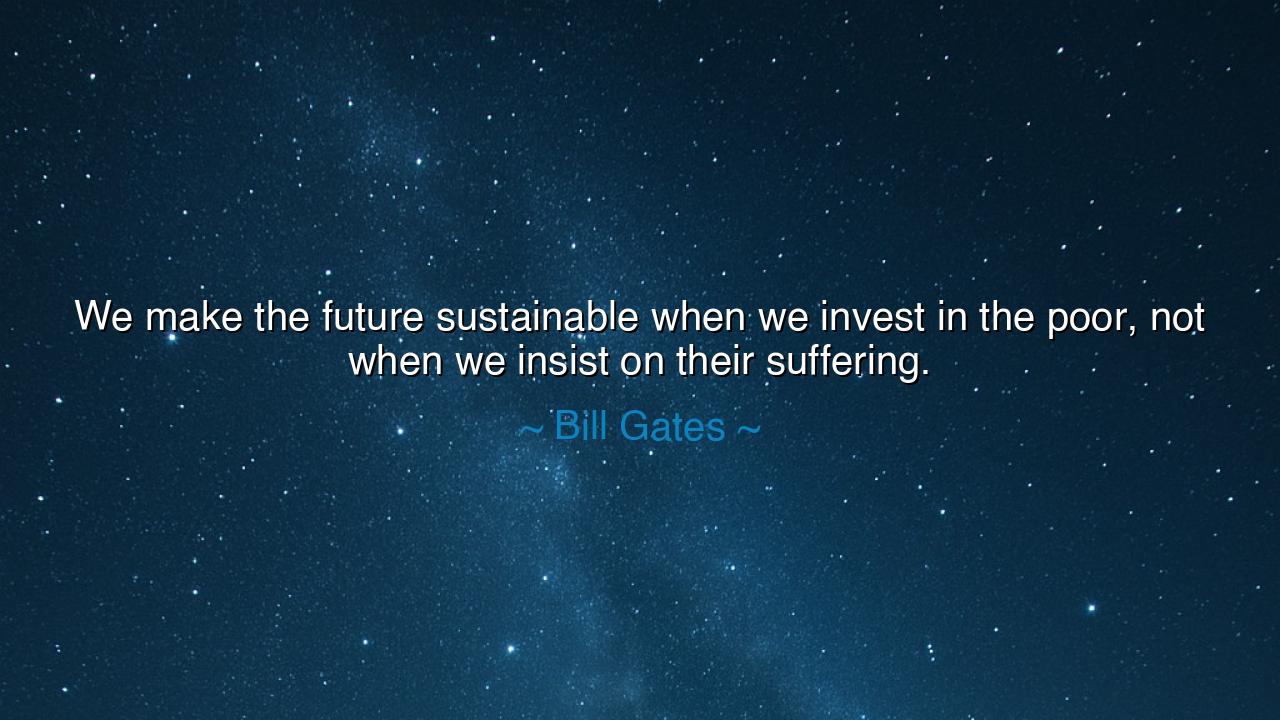
We make the future sustainable when we invest in the poor, not
We make the future sustainable when we invest in the poor, not when we insist on their suffering.






In the tapestry of human history, there have been many moments of sacrifice, struggle, and hardship, where the fate of the many has been shaped by the treatment of the few. Bill Gates's words, "We make the future sustainable when we invest in the poor, not when we insist on their suffering," strike at the very core of this truth. They remind us that the true measure of a civilization's greatness is not how it elevates the powerful but how it lifts the most vulnerable. To create a sustainable future for all, we must first ensure that those who have the least are given the tools and opportunities to build their own futures.
In the ancient world, great leaders understood the wisdom of caring for the dispossessed. Cyrus the Great, the founder of the Persian Empire, was renowned not just for his military conquests but for his benevolence toward the people he ruled. Rather than imposing suffering on the conquered, he allowed for the rebuilding of cities, the restoration of temples, and the restitution of people’s rights. Cyrus understood that by investing in the well-being of the poor and the oppressed, he was not merely creating peace in the present but laying the groundwork for a lasting and prosperous future. He showed that a sustainable future is only possible when the marginalized are cared for and included in the prosperity of society.
Similarly, the story of Mahatma Gandhi resonates with this powerful truth. Born into a world where the untouchables were treated as less than human, Gandhi’s entire life was dedicated to uplifting the poor and marginalized of India. He believed that true independence could only be achieved when every Indian, regardless of their birth or status, was empowered to live with dignity and equality. By focusing on the empowerment of the weakest and poorest, Gandhi led a movement that not only freed India from colonial rule but also set the foundation for a more equitable society. His vision was rooted in the belief that sustainability—whether social, economic, or environmental—cannot exist without justice for the oppressed.
Gates’ quote speaks to this same truth, calling for investment in the poorest among us, not out of charity but as a powerful strategy for securing the future. To focus solely on the suffering of the poor, to insist that their misery is inevitable or necessary, is to create a future that is unsustainable, fragile, and rife with inequality. In the modern world, we have seen that when nations invest in education, healthcare, and economic opportunities for the poor, the entire society benefits. South Korea's rise from the devastation of war to become one of the world's leading economies was not achieved by leaving the poor to languish. Instead, the nation invested in education and technology, ensuring that its entire population had the chance to contribute to and share in its prosperity.
The lesson here is simple, yet profound: a sustainable future is not built on exclusion, but on inclusion. The poor, often relegated to the margins of society, are not to be viewed as a burden but as partners in shaping a better world. By investing in their health, education, and economic empowerment, we not only provide them with the chance for a better life but also ensure that the foundation of society is built on solid, equitable ground. Just as Cyrus understood that lifting the lowliest would bring lasting peace, and Gandhi knew that true freedom must be shared by all, we must recognize that the future we dream of is not one where the poor suffer in silence but one where their voices and dreams are heard, valued, and invested in.
In every corner of the world, the cycle of poverty perpetuates itself unless it is broken with intentionality and compassion. As we look to the future, we must ask ourselves: are we creating systems that perpetuate suffering, or are we building ones that provide opportunity for all? Gates calls on us to focus on investment, not just as an economic principle but as a moral imperative. The true measure of a society’s progress is how it treats those who have the least. The actions we take today, the investments we make in the poorest among us, will shape the world for generations to come.
So let us take action, as individuals and as a society, to ensure that we are investing in the future, not by turning a blind eye to the poor, but by empowering them. Let us remember that the sustainability of our world is not guaranteed by the wealth of the powerful, but by the dignity and well-being of all. The future we build must be one where equality is not a distant dream but a present reality, where the most vulnerable are not left behind but are given the chance to thrive. In this, we honor the wisdom of the ancients and the vision of those who have come before us. Only by investing in the poor can we create a future that is truly sustainable for all.






AAdministratorAdministrator
Welcome, honored guests. Please leave a comment, we will respond soon